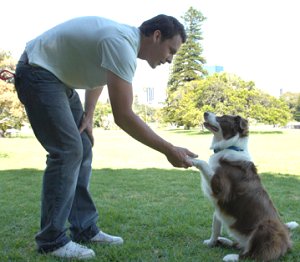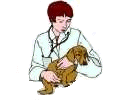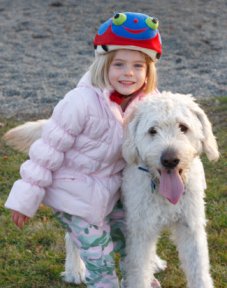Think Your Veterinarian Is Good? Here's How To Tell
By Michele Welton, Dog Trainer, Breed Selection Consultant, Author of 15 Dog Books

Your vet should not be making the decisions about your dog's health care. Instead, you and your vet should work as partners. So choose the right vet to partner with!
You might think you've already found a good veterinarian for your dog.
He or she is a friendly person. The office is not far away. The fees are reasonable. And the office staff greets your dog with smiles and petting.
Nice, certainly! But not the best reasons for choosing a vet.
The number one thing you want to know about a veterinarian is their philosophy of health care.
The most sensible philosophy of health care is holistic
Holistic doesn't mean a bunch of woo-woo voo-doo.... it simply means "whole." A vet with a holistic philosophy looks at the whole picture of what's going on with your dog.
If Molly has a urinary tract infection, a holistic vet will treat it with an antibiotic. But the vet also knows that something is not quite right with Molly's immune system because it wasn't able to kill the bacteria. So the vet will also give nutritional supplements and medicinal herbs to make Molly's immune system stronger to help resist future health problems.
Holistic vets offer guidance on how you can make everything in your dog's daily life health-promoting.
Don't we all want this kind of forward-looking, whole-picture health care for our dog? Yes, of course.

YOU are your dog's primary caregiver. A 15-minute visit to the vet doesn't have as much impact on your dog's health as how you care for her on a daily basis. But when you do need help, a holistic vet is the best choice.
Holistic vets also have a wide range of treatment options to choose from:
- Drugs and medications (such as antibiotics and painkillers)
- Medicinal herbs
- Nutritional supplements
- Homemade diets
- Acupuncture
- Chiropractic adjustment
- Laser therapy
A vet with so many options can choose the gentlest and safest treatment that will do the job with the fewest side effects.
The problem with conventional vets
Sadly, most owners limit themselves to a vet who doesn't offer many treatment options.
Of course owners don't do this on purpose! But if you open the phone book and start calling vets, it's likely that all of them will have a conventional philosophy of health care, rather than holistic.
For almost every health issue, conventional vets offer medications, surgery, or prescription diets.
Of course, those are true lifesavers when really needed! The problem is that conventional vets have to use those treatments for everything because they haven't learned how to use any alternatives – many of which are just as effective and with fewer side effects.
Dr. Richard Pitcairn DVM can tell you more:
 "In our eagerness for quick and easy solutions, we seize on a certain drug that may just cover up symptoms without addressing underlying causes. For example, synthetic cortisone is powerful enough to stop a wide variety of symptoms in their tracks. But inside, the disturbance continues unseen. Animals vigorously treated with such drugs (apparently successfully) go on to develop another condition within a few weeks or months." (Dr. Pitcairn's Complete Guide To Natural Health For Dogs and Cats)
"In our eagerness for quick and easy solutions, we seize on a certain drug that may just cover up symptoms without addressing underlying causes. For example, synthetic cortisone is powerful enough to stop a wide variety of symptoms in their tracks. But inside, the disturbance continues unseen. Animals vigorously treated with such drugs (apparently successfully) go on to develop another condition within a few weeks or months." (Dr. Pitcairn's Complete Guide To Natural Health For Dogs and Cats)
Drugs and medications can have side effects that you don't see, side effects that happen deep inside your dog's body and take some time to cause problems.
 Dr. Nino Aloro DVM says, "Sometimes the side effects are worse than the disease. Standard medications have the potential to cause frightening problems with the liver, heart, kidneys, skin, immune system, and digestive tract."
Dr. Nino Aloro DVM says, "Sometimes the side effects are worse than the disease. Standard medications have the potential to cause frightening problems with the liver, heart, kidneys, skin, immune system, and digestive tract."
Why don't conventional vets offer more kinds of treatments? Because they don't know how. Veterinary colleges teach classes that rely on medications, surgery, and prescription diets. Vets who want to add more skills, such as acupuncture or herbology, need to take extra courses.
Holistic vets have chosen to do that. Conventional vets have chosen not to.
A conventional-only philosophy deprives your dog of valuable treatment options that might really help his long-term health.
 Also, many conventional vets (probably most, to be honest) don't give good advice about your dog's all-important general care.
Also, many conventional vets (probably most, to be honest) don't give good advice about your dog's all-important general care.
For example, most conventional vets recommend dog food that isn't suited to a dog's digestive tract. Their nutrition class was taught by the employees of a commercial dog food company – hardly an objective source. Read Two Shocking Reasons Vets Recommend Kibble and Canned Dog Food.
Most conventional vets give too many vaccinations, even though the research is clear that over-vaccinating can damage your dog's health. Most conventional vets suggest spaying and neutering too early, despite studies that show the health risks.
So.... most conventional vets simply don't give good advice about your dog's general care. Holistic vets do much better in this all-important area.
Holistic vets are hard to find
Unfortunately it can be difficult to find a holistic vet.
A real one, I mean. Quite a few vets CALL themselves holistic, but they're really not. Holistic, you see, has become a vague "fad" word. Sort of like organic or all-natural, where the definition depends on who you ask.
Here's my definition of a truly holistic vet....
A truly holistic vet offers a full range of treatments (conventional and alternative). And a truly holistic vet helps you make your dog's daily routines and lifestyle as health-promoting as possible.
Based on my definition, vets who offer only a few types of treatments aren't holistic.
- If all they offer are drugs, medications, surgery, and prescription diets, those vets are conventional.
- If all they offer are medicinal herbs, nutritional supplements, chiropractic adjustment, acupuncture, or some other healing method, I call those vets alternative.
Only when a vet integrates both conventional and alternative treatments do I call him or her truly holistic (or integrative is another good word).
Assembling your veterinary team
If you don't live near a truly holistic or integrated vet... don't despair. Most pet owners (including myself) don't. So let me tell you how I still obtain excellent veterinary care for my dogs.
 I have a wonderful alternative vet who is certified in herbal medicine and acupuncture. She also does chiropractic and prescribes drugs (such as antibiotics and pain medications) when needed. And she does bloodwork and basic diagnostic tests.
I have a wonderful alternative vet who is certified in herbal medicine and acupuncture. She also does chiropractic and prescribes drugs (such as antibiotics and pain medications) when needed. And she does bloodwork and basic diagnostic tests.
She comes very close to being a true holistic vet! But she does not offer vaccinations, dental cleaning, surgery, or advanced diagnostic tests like X-rays or ultrasounds.
For those, I turn to my wonderful conventional vet.
Both vets share a valuable trait – open-mindedness. They appreciate what the other has to offer, and work cooperatively through me. The three of us are a team providing the best possible integrated (holistic) care for my dogs.
 There have been times when other vets needed to join our team. As when my Papillon needed a quick X-ray and of course it was a holiday weekend (isn't it always?!).
There have been times when other vets needed to join our team. As when my Papillon needed a quick X-ray and of course it was a holiday weekend (isn't it always?!).
Fortunately I had already chosen a 24-hour emergency practice. It pays to plan ahead and know who you will call if X or Y should happen in the middle of the night or on a holiday weekend. You don't want to waste valuable minutes making frantic phone calls to find someone who is open.
If you don't live near a holistic/integrated vet "who does it all", you should look for both an alternative vet and a conventional vet, so your dog can be treated in an integrated manner with all possible treatments available. And you want both vets to be open-minded and supportive.
If your current vet isn't supportive
Do you think the vet you're using right now would be agreeable to your ideas about your dog's health care? Even if those ideas are different from what the vet suggests?
If that turns out to be the case, excellent! But in my experience, most conventional vets are friendly and smiling as long as you agree to everything they want to do.

Many vets are "rigid" in their thinking, not open to anything outside their own training. Don't let that stop you from pursuing the best health care practices for your dog.
But suppose you say,
- "I'm interested in feeding my dog a homemade diet. Maybe cooked, maybe raw."
- "I've learned that booster shots are no longer required every year."
- "I'd like to do a little research before I agree with your treatment plan."
- "I'd like to run this by my other vet and get her take on it."
Then those smiles might vanish.
Vets disagree with each other about a lot of things, but often your vet doesn't want you to know that. Human doctors are the same way – they declare their opinions to be facts, and they never tell you that other doctors disagree with them. Many doctors and vets just want us to do what they say, no questions asked.
But you and I both know that doing your own careful research is good. Getting second opinions is perfectly reasonable. And when it comes to your dog's health, the more treatment options available to you, the better..
So if your vet doesn't believe in holistic philosophies or alternative treatments, you should seriously consider finding another vet.
Remember that YOU are in charge of your veterinary team
The conventional vets I use are smart and dedicated and I very much appreciate their skills.
But I always keep in mind that they have conventional mindsets, so their advice always revolves around surgeries, prescription diets, and drugs and medications.
In other words, when a conventional vet gives advice, you're getting only some of the possible options – the ones he has been trained in.
When my dog has tests done, I listen to what my conventional vet has to say about the results. I listen to his recommendations for treatment. I ask lots of questions. And then I go home and do some research on my own. And I ask my alternative vet for HER recommendations.
Often I decide to follow some of the recommendations from each one, combining the wisdom each brings to the table.
You can see why a single holistic (or integrative) veterinarian would be better! Then you wouldn't need to go back and forth between two vets, which takes more time and money. Fortunately you might be able to find vets who encourage communication by phone and email, as my own vets do.
But however you need to do it, valuable treatments that can make a difference to your dog's health should not be overlooked.
Finding an holistic/integrative vet
Your mission.... to find a holistic/integrative vet in your area who practices both alternative and conventional medicine.
Most veterinarians who graduate from veterinary school join the American Veterinary Medical Association (AVMA) and go on to practice conventional medicine. Those vets are a dime a dozen and are not the vets you're looking for right now.
You're looking for the vets who also completed courses in alternative medicine. These vets not only join the AVMA, but also typically join the AHVMA, as well. The H stands for holistic.
To find these vets...
Visit the AHVMA website and click on the link that says Find a Vet (or Find a Member).
Use the search function. If there's a vet within driving distance, make sure it says the vet treats Small Animals. Some vets only treat Equines (horses).
Also check the healing techniques (or modalities) offered by the vet. Some will be familiar (nutrition, herbs, acupuncture), while others (applied kinesiology?) will make you scrunch up your face and say, "What's THAT?"
I'm dubious about some techniques myself, so I stick to those that have been well-proven, or successful for my own dogs or dogs owned by trusted friends and colleagues.
Specifically, the techniques I look for (in alphabetical order, not order of preference) are:
- acupuncture
- Chinese herbs
- chiropractic
- conventional medicine
- nutrition
- western herbs
Keep in mind that if a vet does practice some or all of these techniques, but NOT conventional medicine, I consider that vet alternative. With that vet on your team, you would also want a conventional vet in order to have an integrated team.
Back to your list of vets... some listings include a website, which you should certainly visit.
To add more vets to your list, do a Google search for:
holistic vet Maryland (obviously substitute your state!)
Calling holistic vets
If you have found some integrated or alternative candidates, your next step is to find out whether you want to work with them. Holistic vets are individuals, just like everyone else.
- Some graduated at the top of their class. Others graduated at the bottom.
- Some are highly skilled. Others are much less competent.
- Some are friendly and easy to work with. Others are brusque, arrogant, or intimidating.
And beware... some vets who bill themselves as holistic don't really have holistic attitudes. Dr. Crumpet may have taken a few courses in natural health care, then joined the AHVMA. But if he continues to practice conventional medicine, with a few herbal remedies thrown in when the owner insists on it, Dr. Crumpet is certainly not a holistic (or even an alternative) vet.
But... if you can't find a truly holistic vet and you need to assemble a team, Dr. Crumpet might serve as the conventional half of your team. He's obviously open-minded about alternative treatments and that's a big plus in a conventional vet.
But for now, let's keep looking for a truly holistic/integrated vet.
You have the phone number of one or more candidates? Call them. Tell the receptionist you're looking for a holistic vet and that you'd like to ask just three questions about Dr. X. The receptionist might be happy to talk to you herself, or she may pass the phone to someone who is better equipped to answer.
Initial telephone questions
![]() "Does the vet offer both conventional and alternative treatments? What kinds of alternative treatments?"
"Does the vet offer both conventional and alternative treatments? What kinds of alternative treatments?"
You've already seen the vet's listing on the AHVMA website, which included their modalities, but ask anyway. The vet may have added (or stopped offering) a modality that you're interested in. Might as well find out now!
The receptionist might tell you that the office is composed of several vets who each specialize in one or more modalities. For example, one vet might specialize in acupuncture and medicinal herbs, while another practices conventional medicine.
This kind of team-oriented practice is nice because all the vets are under one roof and can easily communicate with each other. But it's a little less convenient than one vet who "does it all."
![]()
 "Does the vet support homemade feeding? Raw feeding? What kind of dog food do they sell in the office?"
"Does the vet support homemade feeding? Raw feeding? What kind of dog food do they sell in the office?"
From all my feeding articles, you probably know whether you want to make your dog's food from scratch or feed a pre-made diet. You should know whether you want to feed cooked or raw. You want a vet who supports your feeding method.
If a vet is claiming to be holistic, but is selling Science Diet, that would end the phone conversation for me right there!
![]() "What does the vet generally recommend for vaccinations, for puppies and for adult dogs?"
"What does the vet generally recommend for vaccinations, for puppies and for adult dogs?"
You want a vet who is following the research and recommending only the few puppy vaccinations that are essential, and no annual boosters. Some vets will recommend boosters every 3-5 years, which is okay as long as your dog's titers (current immunity levels) are tested first.
Meeting the vet
If you receive promising answers to your initial phone questions, you should schedule a Wellness Appointment so you can meet the vet in person.
Just looking around the vet's office can tell you a lot!
First I look around the office. I'm not so much looking FOR certain things as I'm hoping that I don't see those things.
For example, in a conventional vet's office, virtually everything you see is tied to pharmaceutical or pet food manufacturers.
Brochures and posters on the wall hawk medications. The shelves are typically stocked with Science Diet. On the walls are often certificates proclaiming the vet's assistants to be Certified Nutritionists, based on a nutrition course sponsored by... the Hill's Company, makers of Science Diet. No conflict of interest there, right?
I don't want to see these things in the office of a holistic or alternative vet!
When you meet the vet:
- Repeat the questions you asked on the phone about feeding, vaccinations, and the treatments he offers. You want to hear these answers from the vet himself.
- If he does acupuncture or chiropractic, ask what his certifications are. Ideally he will be a member of IVAS (International Veterinary Acupuncture Society) or AVCA (American Veterinary Chiropractic Association).
- Ask how long it takes to get an appointment if your dog is ill. Holistic vets are often in high demand and this can mean waiting too long for your dog to be seen. If this is the case, you will need to scope out a secondary vet to have on hand.
- Ask the vet what days and hours he keeps. Ask how he handles problems that come up outside of those hours. Unless it's a multi-vet practice, you'll probably be referred to a 24/7 emergency clinic, which are expensive and totally conventional. I only use them for true emergencies.
- Ask if he does vaccinations. Titer tests? Dental cleaning? Neutering? What kinds of diagnostics can be done? X-rays? Ultrasounds? Does he have his own bloodwork lab in the office or does he send blood out?
Alternative vets often focus on their specialties and may not offer all the services you might need. Hence the typical need for more than one vet on your dog's health care team.
- Ask the vet, "What does holistic mean to you?" There's no right answer to this question. It just gets the vet talking so you can see if his explanation resonates with yours. If you're going to be working with someone, you want them to speak so that you understand.
- Of course, you also want the vet to do a nose-to-tail checkup of your dog, so you can see how they interact with each other.
 Finally, ask the vet about his fees. An office visit with a holistic/integrative or alternative vet usually costs more than an office visit with a conventional vet. Often considerably more.
Finally, ask the vet about his fees. An office visit with a holistic/integrative or alternative vet usually costs more than an office visit with a conventional vet. Often considerably more.
There are two reasons for this:
- Unlike a conventional vet, a holistic vet does not receive income from unnecessary annual vaccinations. Many don't sell kibble or canned food or offer lucrative services such as dental cleaning. That lost income must be made up somewhere so the vet can stay in business. Holistic vets often make up that income with higher consultation fees.
- Unlike a conventional vet, a holistic vet spends considerable time (often 30 to 60 minutes) with each patient, carefully going over your dog and asking detailed questions about behaviors and daily routines.
However, some holistic vets do charge fees that I think are much too high and wouldn't be comfortable paying.
Finding an open-minded CONVENTIONAL vet
Suppose you can't find a good holistic/integrated vet, but you DO find an alternative vet. Very good!
Next you'll need a conventional vet who is open-minded and supportive of your desire to raise your dog on a natural diet, minimal vaccinations, alternative treatments such as acupuncture and herbal medicine, and so on.
If you think your current vet will be supportive, excellent! If not, open your phone book (or a search engine), find vets in your area, and start calling. Say something like:
"I'm looking for a new vet for my dog and I'd like to ask a few questions about your veterinary practice. Are you the right person to talk to?"
Continue with:
"I'm looking for a vet who will be comfortable working with me. I use alternative medicine as well as conventional. I feed (a homemade diet) (raw diet) and I do titer tests, not regular booster shots. Do you think one of the vets at your practice might be a good fit for me?"
If you receive a positive answer, schedule an appointment to meet the vet. In the previous section, I recommended questions to ask a holistic vet. You can ask a conventional vet variations of these same questions.
Also ask about high-tech diagnostic equipment. One of the advantages of a conventional vet is that they're more likely to have sophisticated diagnostic tests such digital X-rays or ultrasounds.
Working ONLY with a conventional vet
You're disappointed. After searching diligently, you haven't been able to find a vet who is holistic/integrated or even alternative.
You're going to have to work exclusively with a conventional vet.
That is very unfortunate and means that you must be an extra-alert advocate for your dog.
- At the vet's office, don't turn your dog over to anyone. You want to be a participant in his care, not a passive onlooker who just pays the bill.
- Unless he's getting an X-ray or dental cleaning or surgery, don't let anyone take your dog "into the back" where you can't see what's happening.
- Don't sit in the waiting room while the vet examines or "does stuff" with your dog. Stay with your dog.
To be an ADVOCATE for your dog, you must be WITH your dog. You must be his voice, his guardian, his protector.
Also don't feel rushed to make decisions in the vet's office. If he is suggesting a long-term course of treatment – for example, if he wants to put your dog on meds for low thyroid, or allergies, or scratching... you can always tell him that you want to think about it and that you'll call back.
THEN GO HOME. Learn about the health issue online. There are even holistic vets online who offer phone consultations. Do a Google search for:
holistic vet phone consultations
Don't let all of your dog's health care come from VETS

Raising a healthy child isn't done at your doctor's office. It's done at home, with a little help from your doctor when needed. Same with raising a healthy dog.
You do need to line up the members of your veterinary team. But there's much you can do on your own, starting right now, to protect your dog's health so he can avoid health problems and NOT need to visit your veterinary team very much at all.
Holistic health care is a complete way of living with your dog.
To raise your dog holistically, you need to do many little things on a daily basis. Real food, minimal vaccinations, a non-toxic environment (look everywhere!), parasite control, a clean well-groomed body, plenty of exercise and mental stimulation, emotional security, and SAFETY (look everywhere!).
All these little things add up to protect and strengthen your dog's body and mind and immune system. If he does become sick, the chosen treatment should be the most effective one with the fewest side effects.
Instead, many dog owners raise their dog conventionally while occasionally dabbling in a bit of "natural medicine" – only to find that it doesn't work.
That's right. It doesn't. If a dog is eating kibble every day.... if he is vaccinated every year.... if his bed is washed with chemical-laden detergents.... if he is bathed with fragrant shampoos.... if he is treated with steroids for chronic allergies or with repeated courses of antibiotics for chronic ear infections.... if his home contains air fresheners or cigarette smoke....
....natural remedies will probably not work. You can't undo a whole bunch of bad stuff with a few herbs.
Instead, raise your dog in all the ways I recommend in my health care articles. Start with Dog Health Care – The Sensible Way. Then use a combination of conventional and alternative medicine to treat health problems. That's what I do.
My best-selling books – now available FREE on my website
 Respect Training For Puppies: 30 seconds to a calm, polite, well-behaved puppy is for puppies 2 to 18 months old. Your puppy will learn the 21 skills that all family dogs need to know. Click here to read for free.
Respect Training For Puppies: 30 seconds to a calm, polite, well-behaved puppy is for puppies 2 to 18 months old. Your puppy will learn the 21 skills that all family dogs need to know. Click here to read for free. Teach Your Dog 100 English Words is a unique Vocabulary and Respect Training Program that will teach your adult dog to listen to you and do what you say. Click here to read for free.
Teach Your Dog 100 English Words is a unique Vocabulary and Respect Training Program that will teach your adult dog to listen to you and do what you say. Click here to read for free. 11 Things You Must Do Right To Keep Your Dog Healthy and Happy helps your dog live a longer, healthier life. Get my honest advice about all 11 Things before you bring home your new puppy, because some mistakes with early health care cannot be undone. Click here to read for free.
11 Things You Must Do Right To Keep Your Dog Healthy and Happy helps your dog live a longer, healthier life. Get my honest advice about all 11 Things before you bring home your new puppy, because some mistakes with early health care cannot be undone. Click here to read for free.
